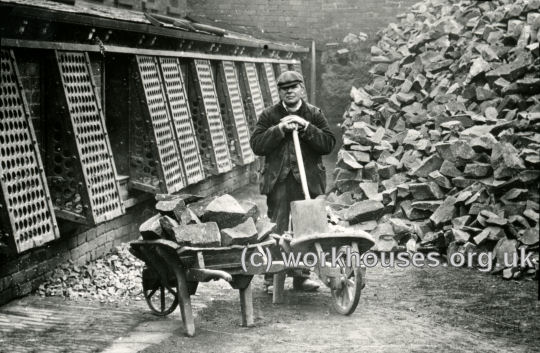
Hackney workhouse stone yard c.1900 © London Borough of Hackney Archives Dept.
Stone-breaking was also a favourite task to be given to vagrants staying overnight in the workhouse tramp wards. From the 1880s, these often had special cells where the men were detained until they had broken the required weight of stone into pieces small enough to fall through a grid to the outside.*
Stone-breaking was also a favourite task to be given to vagrants staying overnight in the workhouse tramp wards. From the 1880s, these often had special cells where the men were detained until they had broken the required weight of stone into pieces small enough to fall through a grid to the outside.*
For a brief moment when listening to the radio yesterday, I thought I was listening to a reading from a 19thC novel. Then reality clicked in and I realised in fact it was the news and the latest policy announcement from the Tory party conference. As the Independent reports today:
All those who have been unemployed for three years will have to do some work or training in return for their benefits – or attend a jobcentre every day – under tough measures to be laid out in detail by George Osborne today.My first reaction - like many of you I am sure - 'do the Tories honestly believe that forcing long term unemployed workers [that oxymoron is deliberate] to attend a jobcentre daily or pick up rubbish etc will inspire them to rush out and find a non-existent job?' is plainly ludicrous. But then I realised that, if we as a society are returning to 19thC values and mores as the Tories plainly seem to want, then perhaps yes, this is what they believe.
I know I have quoted the Protestant Work Ethic of the 19thC before but Just In Case you have missed it, here we go again:
The Protestant work ethic (or the Puritan work ethic) is a concept in theology, sociology, economics and history which emphasizes hard work, frugality and diligence as a constant display of a person's salvation in the Christian faith....... http://en.wikipedia.org/wiki/Protestant_work_ethicIn other words, if one was poor and needy in the 19thC it was a sign that God was displeased with you and if you were rich and successful it was a sign that you had gained God's favour by working hard, and the richer you became the more pleased God was. So the poor had to keep working harder and harder because the reward was in God's hands [quite convenient for the employing class not having to pay more in wages, obviously] and the rich had to make more and more profits to prove that God was even more pleased with their 'industry'. That of course is a quick, cynical, marxist interpretation of Weber's theory but I am Elizannie.
The Independent goes on to say:
But the Chancellor will tell the conference: “For the first time, all long-term unemployed people who are capable of work will be required to do something in return for their benefits to help them find work.
Maybe I am naive, but if there is 'something' for long term unemployed 'to do', couldn't these 'somethings' be construed as jobs? And thus wouldn't the unemployed be employed and then they wouldn't be unemployed any more and would pay tax and national insurance. I seem to have missed something somewhere along the way. I do know several people who whilst unemployed wanted to work in various charitable, unpaid areas such as schools, care homes etc to raise their skills but this was not allowed/was impractical by the rules of the jobcentres they attended.
*The photograph above is taken from the site maintained by the great Peter Higginbottam http://www.workhouses.org.uk Please visit the site not just because it is so interesting for a vision of what a return to 19thC values could mean.






